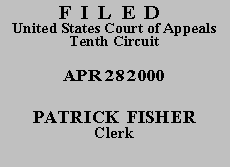 UNITED STATES COURT OF APPEALS
UNITED STATES COURT OF APPEALS
 UNITED STATES COURT OF APPEALS
UNITED STATES COURT OF APPEALS
TENTH CIRCUIT
| KENNETH LYLE SPANGLE, | |
| v. | Nos. 99-1370, 99-1371 |
| WARDEN HOLT, USP Florence, | (D.C. Nos. 99-Z-640, 99-M-641) |
ORDER AND JUDGMENT(*)
Before BALDOCK, HENRY, and LUCERO, Circuit Judges.(**)
Petitioner Kenneth Lyle Spangle, proceeding pro se, filed two petitions for a writ of habeas corpus pursuant to 28 U.S.C. § 2241 in federal district court challenging federal prison disciplinary actions. The district court dismissed the petitions and denied Petitioner's motions to proceed in forma pauperis on appeal, concluding that the appeals were not taken in good faith. See 28 U.S.C. § 1915(a)(3); Fed. R. App. P. 24(a)(3). Petitioner appeals the dismissals and renews his motions to proceed in forma pauperis on appeal. This court consolidated these cases on its own motion. We exercise jurisdiction pursuant to 28 U.S.C. § 1291.(1) We deny Petitioner's motions and dismiss the appeals.(2)
In the first district court case, Petitioner challenges a prison disciplinary conviction that deprived him of good time credits. Petitioner was convicted of fighting: a guard testified that he saw Petitioner kicking his cellmate, Stevens, who was lying face down on the floor of the cell. Petitioner alleges that the disciplinary proceedings deprived him of due process. He seeks restoration of good time credits and expunction of the incident report. The district court properly construed this challenge to a prison disciplinary action as a proceeding under 28 U.S.C. § 2241, see McIntosh v. United States Parole Comm'n, 115 F.3d 809, 812 (10th Cir. 1997), but dismissed the petition, concluding that Petitioner was not deprived of due process. Petitioner also challenged the conditions of his confinement pursuant to Bivens v. Six Unknown Named Agents of Fed. Bureau of Narcotics, 403 U.S. 388 (1971). He alleged that sharing a cell with Stevens violated his Eighth Amendment rights. Because Petitioner asserted no claims for relief under the Eighth Amendment, the district court declined to consider the claim on the merits.(3)
In the second case, Petitioner challenges another prison disciplinary action. Prison officials disciplined Petitioner for violating a rule against indecent exposure by sitting naked in his cell while a female guard conducted a census. Petitioner disputes that his actions constituted indecent exposure and argues that the incident report was overly vague because it failed to specify which parts of his body he exposed. He again seeks restoration of good time credits and expunction of the incident report. The district court dismissed the petition, concluding that it too failed to state any factual basis for relief.
To proceed on appeal in forma pauperis from the dismissal of a § 2241 petition, a petitioner must show both "a financial inability to pay the required fees and the existence of a reasoned, nonfrivolous argument on the law and facts in support of the issues raised on appeal." McIntosh, 115 F.3d at 812. After thoroughly reviewing the records on appeal, Petitioner's briefs, and the district court's orders, we conclude that the arguments Petitioner raises in support of his petitions are meritless substantially for the reasons set forth in the district court's orders. Accordingly, we deny Petitioner's motions to proceed in forma pauperis on appeal and dismiss his appeals. See Hirsch v. Secretary of the Army, No. 98-1468, 1999 WL 110549, at *2 (10th Cir. Mar. 2, 1999) (unpublished) (dismissing the appeal of a petitioner who failed to make a nonfrivolous argument for relief).
MOTIONS DENIED; APPEALS DISMISSED.
Entered for the Court,
Bobby R. Baldock
Circuit Judge
*. This order and judgment is not binding precedent, except under the doctrines of law of the case, res judicata, and collateral estoppel. The court generally disfavors the citation of orders and judgments; nevertheless, an order and judgment may be cited under the terms and conditions of 10th Cir. R. 36.3.
**. After examining the briefs and appellate record, the panel has determined unanimously that oral argument would not materially assist the determination of this appeal. See Fed. R. App. P. 34(a)(2)(c); 10th Cir. R. 34.1(G). The case is therefore ordered submitted without oral argument.
1. The district court entered judgment in 99-Z-640 on June 15, 1999 and entered judgment in 99-M-641 on June 14, 1999. Petitioner had 60 days to file a notice of appeal. See Fed. R. App. P. 4(a)(1)(B). The time periods expired on August 16 and August 13, respectively. The district court docketed Petitioner's notice of appeal on August 19. The date on the face of Petitioner's notice of appeal, however, is August 6. Because this date raises an inference that Petitioner relinquished control over the notice to prison authorities on that day, the notice of appeal was timely filed under the "prisoner mailbox rule." See Houston v. Lack, 487 U.S. 266, 275-76 (1988) (filing occurs when the pro se prisoner delivers the documents to prison authorities for mailing).
2. Petitioner, as a federal prisoner appealing a district court's denial of a petition under § 2241, does not need a certificate of appealability under 28 U.S.C. § 2253(c)(1). See Montez v. McKinna, ___ F.3d ___, ___, 2000 WL 342235, at *3 (10th Cir. Apr. 3, 2000); cf. id. at *4 (applying the certificate of appealability requirement to state prisoners filing petitions under § 2241).
3. Even if Petitioner had sought relief other than the restoration of good time credits and the expunction of the incident reports, we would still conclude that Petitioner's Eighth Amendment claims lack merit.